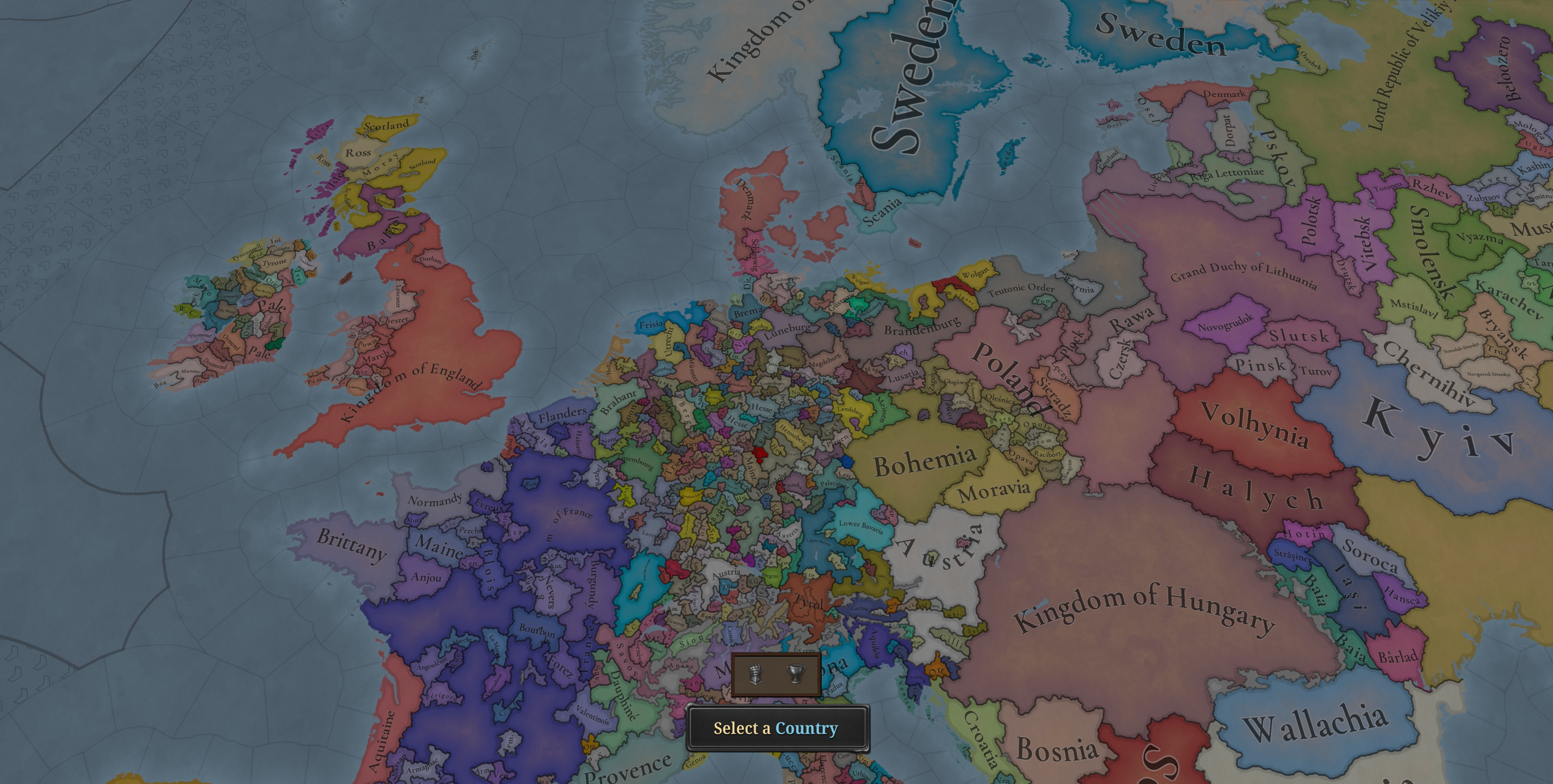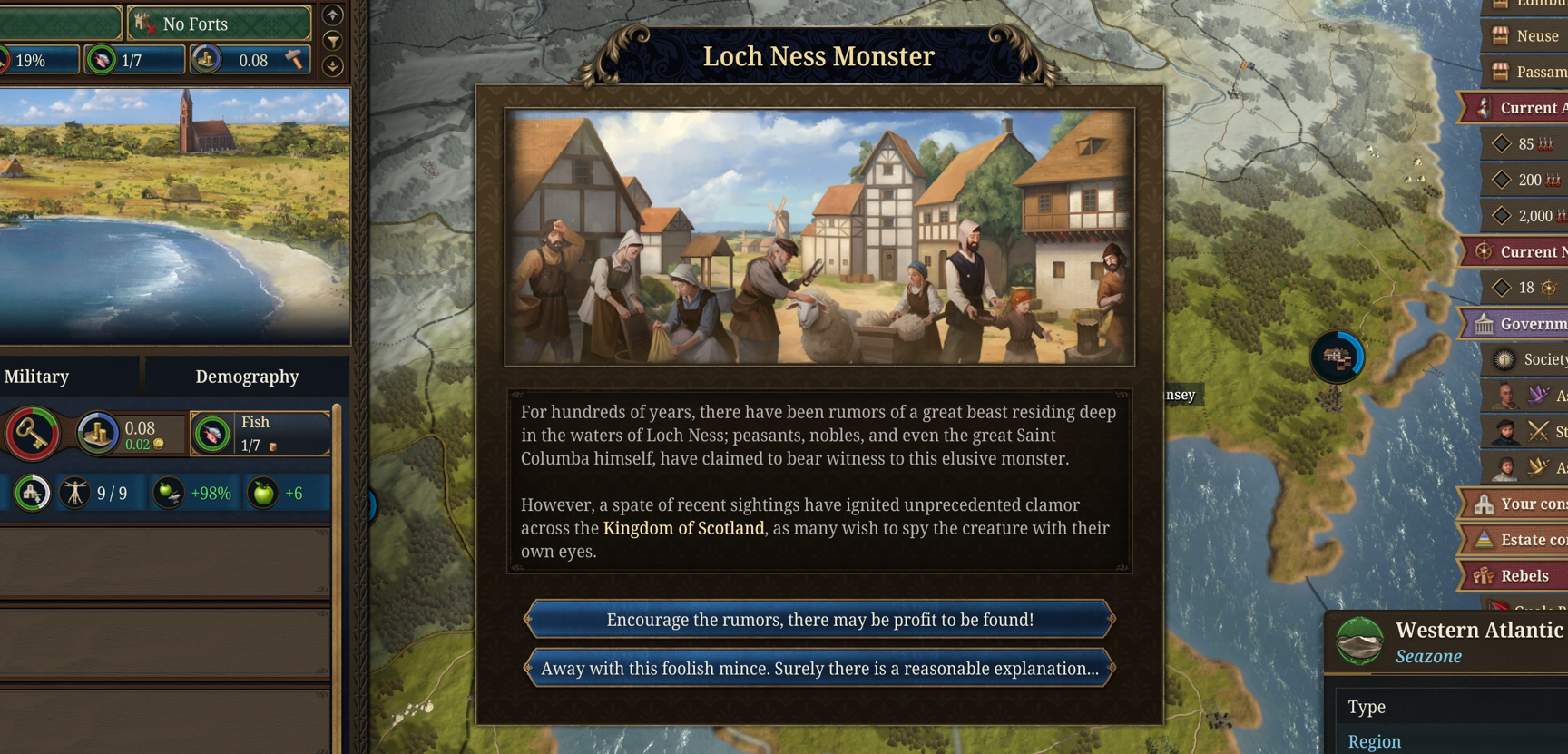As one of the nerdiest Paradox grand strategy series around--and that's saying something--you would think that giving someone nearly an entire month to review the latest Europa Universalis game would be more than enough time to get a handle on it. And yet!
Despite Paradox giving reviewers a remarkably generous lead-in--only a select few Japanese series like Yakuza or Persona have given as long in recent memory--as the Europa Universalis V embargo crept ever-closer last week I found myself staring at my disjointed notes and a blank page thinking "man, there is just no way I can review this".
Not because I can't review grand strategy games themselves--I love doing that!--but because whether intentionally or not, Paradox's first-party efforts have over the last few years become increasingly malleable things, changing their core features and sometimes entire vibes every time an expansion, update or even patch rolls around.
Victoria 3, for example, has had a rollercoaster ride of tweaks and balances since launch. And Crusader Kings III, which somehow released over five years ago now, has in that timeframe become almost something else entirely, landing as a prettier Crusader Kings II before turning into everything from a singleplayer RPG to, in its latest expansion, a game that spans as far as China and Japan.
Both of which are fine, maybe even great in CK3's case, but all that meddling makes the idea of some kind of review at Europa Universalis V's exact time of launch feel almost irrelevant. What the hell is the point of me giving a long list of thoughts about this game now, in October 2025, when by March 2027 it could be an entirely different experience? Especially when, unlike its more focused stablemates, EU5 is ambitious enough to let you play a single game that begins in the 1300s and ends just before the American Civil War, which means we are messing with a lot of variables here.
Even just during the time I've had a pre-release copy of EU5, the goalposts have moved a number of times, with seemingly harmless bugs (like an overpowered Papacy) repeatedly patched out because they were messing up people’s campaigns. And as much as there is already in the game, you can still see the outline of where there's going to be (over the course of years of expansions) so much more, whether it be fleshing out the storylines of minor nations to making more far-flung tribes and nations playable.
Also standing in my way of being able to give some kind of proper "review" of EU5 is the fact that, even with weeks to play it, I still feel like I've barely scratched the surface of its systems and possibilities. Some of the updates made to my pre-release copy broke older saves, so I've only had time to play as three nations (Holland, England and Scotland), and there's so much to this game that it might be months before I've fully come to grips with stuff like its economic management.
In many ways these games have become their own kind of MMO or Forever Shooter. Many outlets won't score games like that anymore, or will update their thoughts several times as they go. Some of my favourite pieces of critical work over the past decade haven't been reviews of Paradox games but re-reviews of them, checking in years after release to see how they've evolved and bedded in. To me that feels like the best time to not just experience a Paradox game but to talk about one.

What I can say now, after spending over 100 hours with a game I nevertheless feel I can’t “review,” is that what's there is pretty good! I think. I'm primarily a Crusader Kings and Hearts of Iron guy. I'm not and have never really been an EU guy and that, combined with a weird bug on my last PC that never let me get past the title screen on EU4, means I haven't touched the series since at least 2019, so going into this new entry I couldn't remember shit. I had no idea what was new or just improved, and it took me days just to learn (or re-learn) how to play the game, even with some fairly substantial tutorials attached.
One thing I did instantly appreciate though was a substantial, Football Manager-like series of automation tools. Anywhere you see a gear icon--and that's on practically every menu screen in every aspect of the game--you can click it and the AI will take over that part of your nation's affairs for you. While maybe not necessary for series fiends, or anyone running one of the game's 117,000 tiny German principalities, I found it invaluable when playing as a larger nation (like England) because I simply couldn't be bothered tinkering with every little building and trade deal when I had more important things to do, like exploring distant lands, insulting the Papacy and beating up on France.
The amount of stuff I managed to outsource to the AI was impressive in that it liberated my attention span, and also let me see just how much of the game I still had to learn, which returns to my point above; even with weeks to play EU5 I'm still discovering fundamental things every time I make an errant mouse click or stumble on a hovering tooltip I hadn't noticed before. I didn't know I had to manually upgrade a town to a city until last week. I only found out you could build bridges from a fellow 3MA panellist in a Discord chat. There's simply too much game here for me to even discover, let alone pass comprehensive judgement on, at this stage of its life.
Even with the AI running vast parts of my empire, constant pop-up events still kept me busy, and there's a surprising variety of them, each tailored not just to the age but the people and place as well. Playing as Scotland, I got a number of very Scottish decisions to make, and helpfully the game even has an icon telling you which one is the historical choice if you want to go down that route. Fighting a war is pretty standard Paradox stuff, as is diplomacy, and while slightly cumbersome (in that you can't simply explore a whole ocean, you can only unlock small sections of it at a time) the game's exploration section also works pretty easily.
This superficial side of the game, a feast of just the icing, no cake, was a blast. With no personal interest in the fine details this game offers--the numbers run so deep you can burrow down and see each item being traded in every port, and the specific population breakdown of every town and region in your nation--I loved just focusing on the big picture, and really did feel like I was some kind of demigod managing every aspect of my people's lives for 500 years.
Playing as Scotland I got caught in a messy land war in Ireland. I speedran my break from a corrupt and decadent Catholic Church. I agreed to divide the new world (where I'd founded Scottish colonies everywhere from Greenland to Georgia) with the Pope. I survived the black death, explored the seas and was constantly having to mediate between the vested interests of my nobles, workers and priests. All without ever once dipping into the game's production and trading systems, which lurk beneath the surface of Europa Universalis like the bulk of an iceberg.
Oh, I also had a family to marry off, a complicated alliance with France to maintain, kids to educate, a cabinet to oversee, parliaments to organise and massage votes through, 500 years of scientific research to read over, uprisings to quell, roads to build, navies to maintain. Even on this icing-only diet, there's a LOT TO DO.

I'm not just listing all of that here for the quantity's sake; it all feels consequential. I could always see the reactions to my decisions: shifting prices affect people's welfare and happiness, leading to revolts or migrations or both, and spending money on education got me a more literate population and loads of visible benefits as a result. I have no idea how robust any of this is on a long-term basis--to reiterate once more, I did not come close to surveying this game in its entirety--but it certainly looked and felt real, empowering even.
With its lack of a fully-fledged character system and a (relatively) simple approach to fighting wars, it may lack the personal touch of Crusader Kings or the brutal satisfaction of Hearts of Iron, but EU5 is still Paradox at their best: giving the player a place and time in human history and letting them not just live through it, but dictate its terms.
I played this game a lot over the last month, and what I played, even with its limitations, I loved. I can see myself playing a lot more in the years to come, maybe even enough to fully understand how to play whole sections of it and be able to report back with a better idea of what this game eventually becomes, not what it is at launch.


